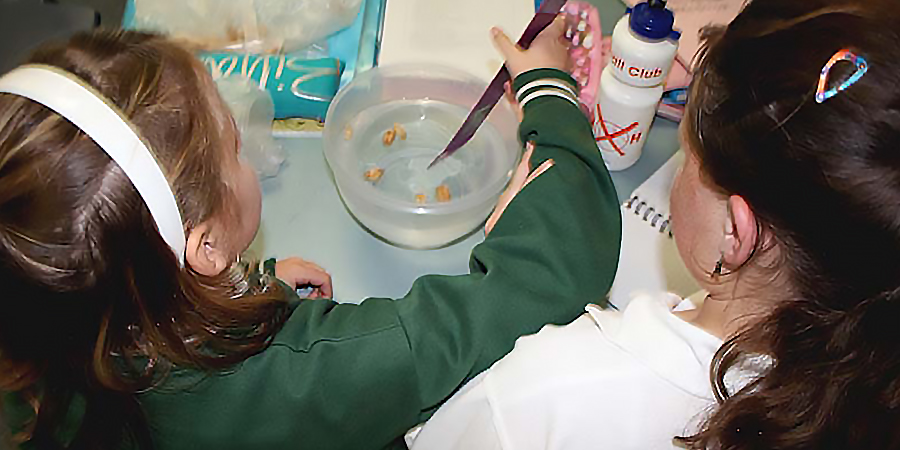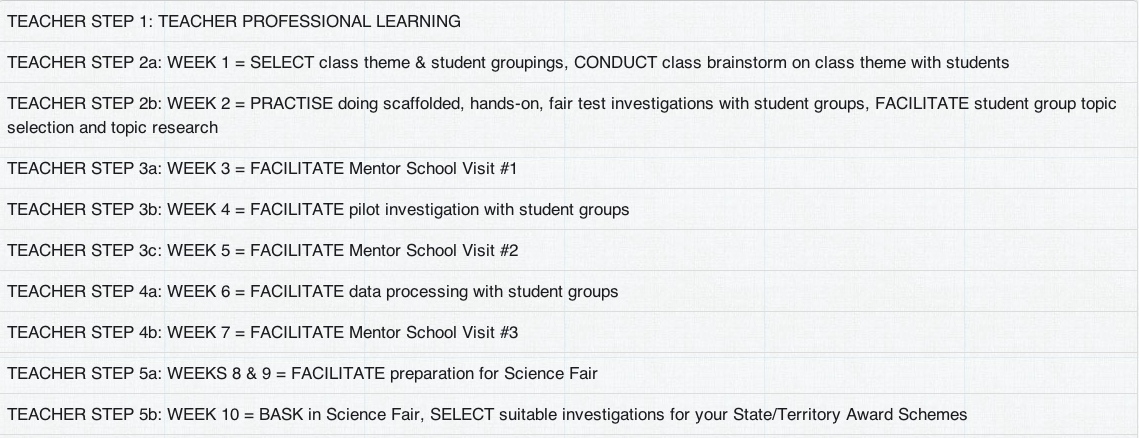TEACHER STEP 4
STEP 1
Professional Learning & Preparation
STEP 2
Phase 1 – High Direction
STEP 3
Phase 2 – Mentored Exploration
STEP 4
Phase 3 – Independence
STEP 5
Presentation & Celebration

Goals for STEP 4
- Facilitate DATA PROCESSING with student groups to prepare for final Mentor/MySTic visit
- Facilitate MENTOR VISIT #3
Scroll down for more information.
STEP 4 – Plan Ahead
- DATA PROCESSING: facilitate first steps with student groups
- MENTOR VISIT #3: prepare for and facilitate
STEP 4 covers WEEKS 6 & 7 of Implementation

STEP 4 – Information
Data Processing
- This step is BETWEEN the second and third mentor visits and is MOST important so that the ANALYSIS and EVALUATION of the data can happen in SCHOOL VISIT #3 with the Mentors/MySTics.
- The purpose of this step is to have students record their data (in tables) and show their findings in a graph. Resources 4.1 – 4.8 support this step:
- ‘4.1 Literacy and Numeracy Video’ presents teachers who describe how literacy and numeracy skills can be developed through MyScience.
- ‘4.2 Processing Data – Introduction’ provides an overview of the step.
- ‘4.3 Data Analysis Expectations’ presents information about stages of learning related to students’ ability to analyse data.
- ‘4.4 Data Tables’ describes the components of a table.
- ‘4.5 Data Averaging’ provides information about averages, stem & leaf plots, median, mode and mean.
- ‘4.6 Graphing’ discusses the type of graph needed to suit different types of data.
- ‘4.7 Hypotheses’ presents a data set to be analysed.
- ‘4.8 Gatorade Video’ presents students who report on their investigation into the effectiveness of a sports drink and critically reflect on their data.
Mentor Visit #3
- The third and final school visit is where students are supported to COME TO A CONCLUSION based on their collected data, and to evaluate the investigation: What worked. What didn’t work. What would be done differently another time. How could the investigation be extended or progressed.
- The point of a scientific investigation is NOT to PROVE a prediction or hypothesis. Data is data. What does the data show?
- An investigation is considered to be HIGHLY SUCCESSFUL when it is a fair test, when there is replication and when the data is meticulously collected – it is not about ‘getting the result that I thought I would’.
- As a THANK YOU to mentors/MySTics for their time and expertise consider having each student group make a CARD. A small GIFT such as a school mug would provide a lasting memory of time with you and your students, and pave the way for future years of involvement.
- The following RESOURCE BUTTONS provide information to help you facilitate Mentors/MySTics and student groups to critically analyse their data:
- ‘4.9 Student Reflections’ presents a video of students reporting about their investigation comparing boys’ and girls’ memory. Note how students reflect about areas for improvement on their investigation.
- ‘4.10 Critical Analysis’ presents questions for students about the RELIABILITY of their data such as: Have they taken enough measurements? Are the measurements over a wide enough range?
- ‘4.11 Making Generalisation’ provides information about the need to take care when extending the results from a small scale classroom investigation to the outside world where many more factors come into play in complex settings.
